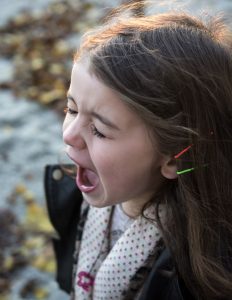My Child Is Cussing at School

So you’ve gotten the dreaded call from school….
“I need you to come into the office, so we can talk about _____’s behavior.”
“We have a problem…”
Your child has gotten angry at another student and called that student an explicit name…
You are embarrassed—angry—humiliated—scared—frustrated—(____) about walking into that school!
The use of cuss words today is common and is all around you. Some people are very obnoxious about their expression through cuss words and others attempt to be respectful of others and choose to only cuss in situations they feel are acceptable.
Children learn new words daily and their vocabulary is growing rapidly. This new vocabulary comes from parents, siblings, grandparents, peers, television, and the list goes on. They are bombarded with new words daily. Children do not usually understand what these new words are or what they mean. They may use them when they are angry because they heard someone else say the same word in a fit of rage.
So how do you nip this in the bud if your child uses foul language to express himself?
1. Recognize where they are learning this from.
Are they hearing you talk this way? If so, you may just want to rethink how you are expressing yourself in front of them as you are their primary teacher. If your child belts out a “bad” word when he drops his ice cream on the floor and his response to you when you ask where he heard that from is “You said it”-be prepared for how you react to this. If you yell at your child for using a word they are learning from you, then what are you really teaching them? Instead, let him learn to admit when he’s wrong and correct his behavior by stating
“You’re right. I did say that, but it was wrong and I shouldn’t use those words. I’m going to do better. I don’t want you using those words because they are not acceptable.” Be honest and admit when you are wrong.
2. Monitor what they are listening to and watching.
If we do not guide their little eyes and ears, no one will. The things they will learn will make lasting impressions, so give them guidance and ensure they are exposed to age appropriate television and music.
3. Do not laugh.
For some, hearing a child cuss seems funny and cute. I assure you- a child cussing is far from cute, and laughing only encourages them to continue to do it. It’s not so cute when you are getting phone calls from teachers because your child is calling them derogatory names or cussing out other students when they are angry.
4. Help them learn to express themselves with appropriate words to label how they feel.
“You are really angry. Tell me what happened before you said ____________.” Help them find more appropriate ways to label the person they may be name calling. “It hurt my feelings when……” “It made me angry when…..”.
5. Replace those bad words
Give them other options that will keep them out of trouble. Using funny words can also help to decrease the anger behind it.
6. Set boundaries with visitors.
If Uncle J comes over to watch the ball game, and he tends to get a filthy mouth when his team misses a play, then let him know in your house you would need him to watch his language. Most people are receptive of this and if not, then you may need to be choosier about who is visiting with your children.
Remember that YOU are the primary example for your child and how they handle conflict and relationships. Think about this for a minute…
*Comment below and share what you will start doing TODAY to be a better example.
Talk to You Soon,
Dayna Sykes
Licensed Child & Teen Therapist
P.S. Share this post with a friend who needs help in this area!
<!--
-->